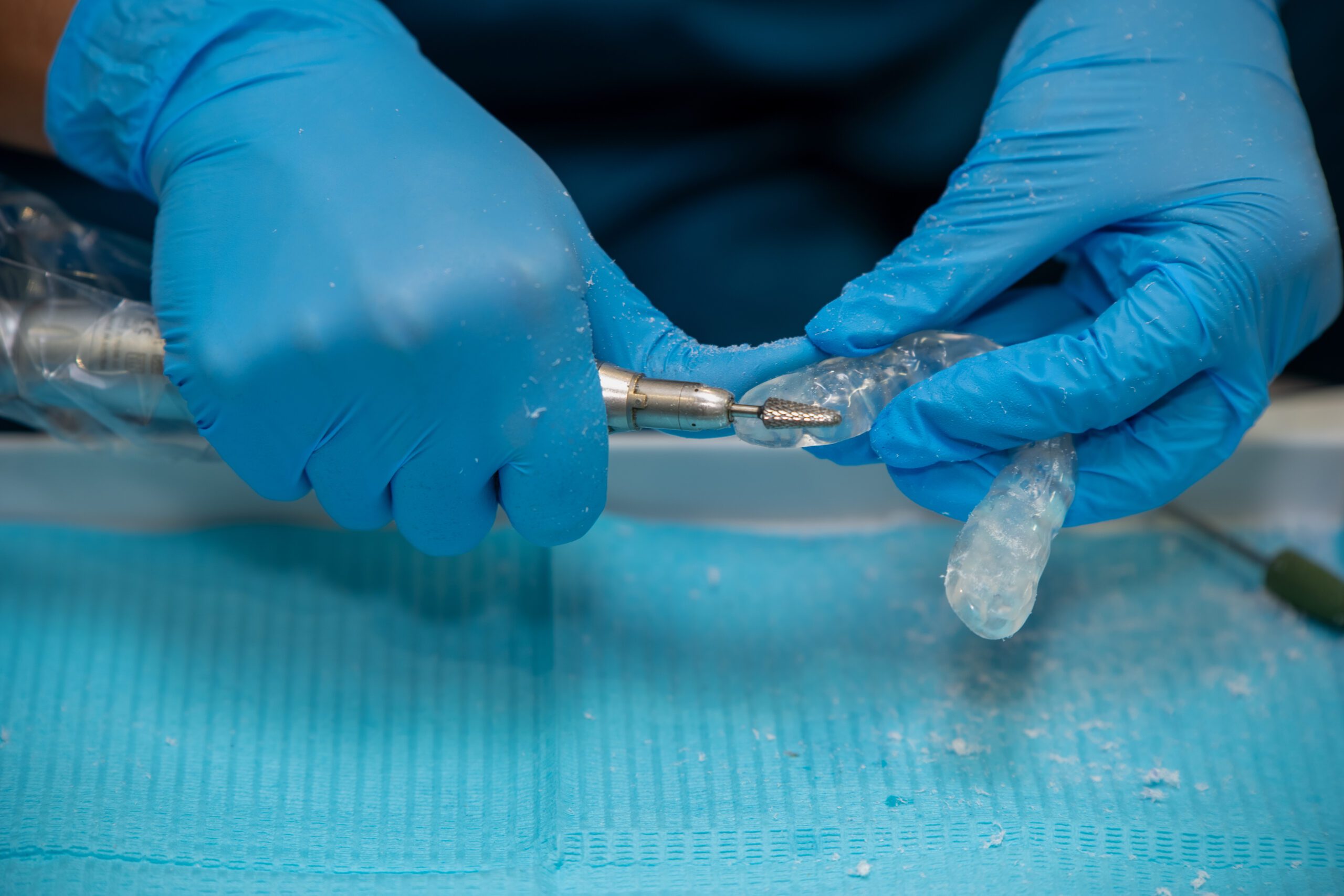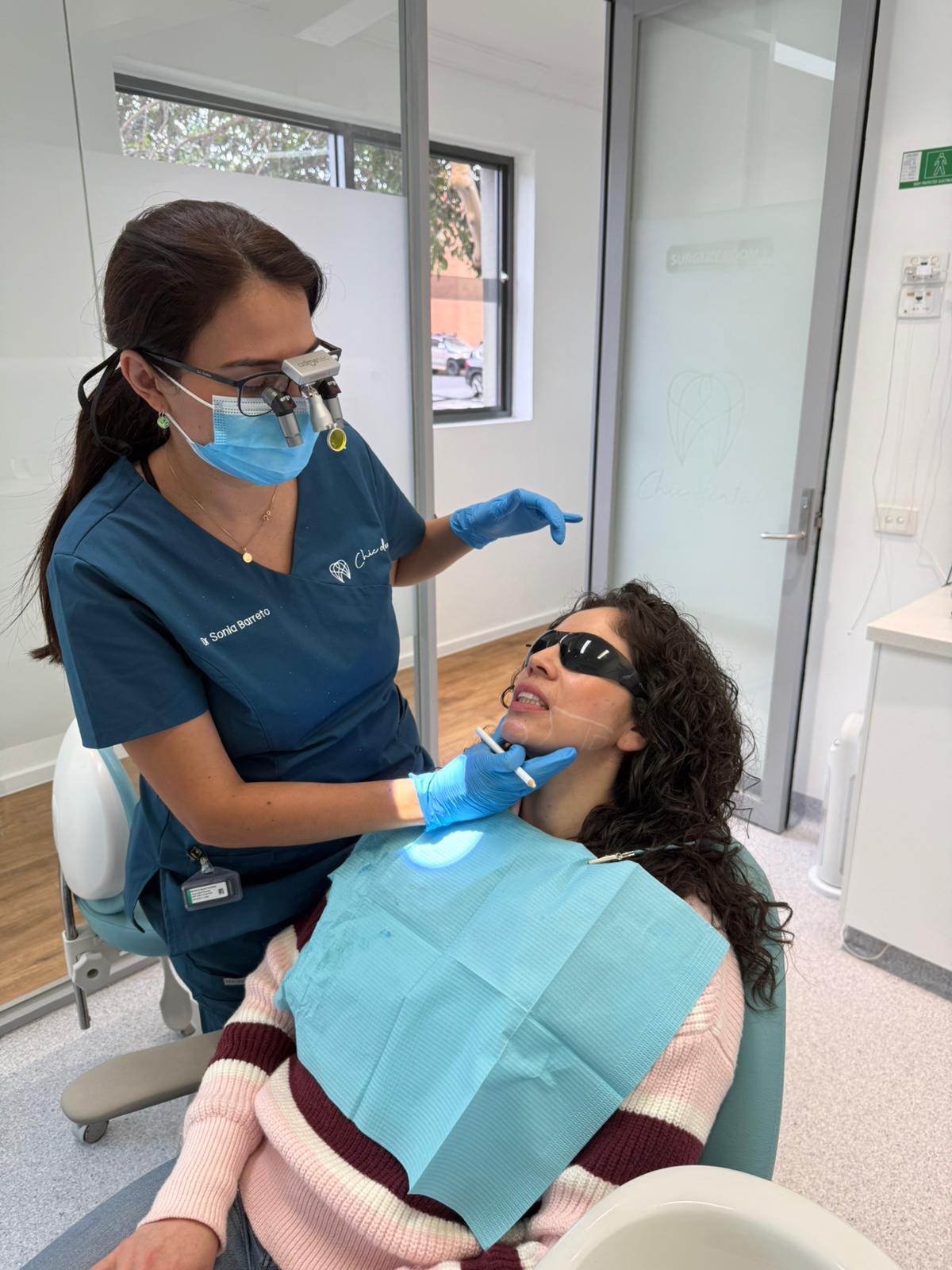
Teeth grinding, also known as bruxism, can cause significant damage to your teeth and jaw over time. At Chic Dental Preston, we provide comprehensive assessment and treatment for teeth grinding to help protect your teeth from wear, reduce jaw discomfort, and improve your sleep quality.
Our approach to treating teeth grinding focuses on identifying the underlying causes and providing effective protective solutions. Whether your grinding occurs during sleep or throughout the day, we can help develop a personalised treatment plan that addresses your specific needs and helps preserve your oral health.
Treatment options vary depending on individual circumstances, and our experienced dental team will evaluate your situation and discuss the most appropriate solutions during your consultation.


Teeth grinding treatment has advanced significantly, using modern techniques and careful assessment to provide effective protection and relief. Today’s bruxism management methods offer benefits that help prevent tooth damage, jaw discomfort, and dental complications, supporting long-term oral health and overall comfort.
Treatment helps protect your teeth from the excessive wear, chips, and fractures that can result from persistent grinding and clenching, preserving your natural tooth structure.
Effective bruxism management can significantly reduce jaw muscle tension, headaches, and facial pain commonly associated with teeth grinding habits.
By addressing teeth grinding, treatment can lead to better sleep for both you and your partner, reducing nighttime disturbances caused by grinding sounds.
Treatment helps safeguard crowns, fillings, and other dental restorations from damage caused by excessive grinding forces, extending their lifespan.
Professional night guards and splints are custom-made to fit your mouth precisely, providing comfortable and effective protection that over-the-counter options cannot match.
Preventing grinding damage through treatment is typically more cost-effective than repairing extensive tooth damage, worn restorations, or treating TMJ disorders later.
With over 15 years of dentistry excellence, we understand that every patient is unique, and our teeth grinding treatment approach is tailored to meet your individual needs and specific bruxism patterns.










Discover the latest in other dentistry. From teeth grinding treatments to specialised dental procedures, our articles provide expert guidance, treatment insights, and practical tips to help you maintain a healthy, functional, and confident smile.

Thinking about getting dentures but wondering how much they cost? It’s a common question, and we’re here to make it easy to understand. Dentures come in different types, and the price can change based on what you need. Whether it’s a full set or just a few teeth replaced, knowing the costs can help you […]

Always use a soft toothbrush on your child’s teeth. Plaque (the substance that ultimately leads to cavities) is of a soft, sticky consistency and can be removed easily from the teeth and gums with soft bristles. Until your child turns six, use only a pea-sized amount of low-fluoride toothpaste. Once a child is six years […]

Gingivitis is an early gum disease and occurs when dental plaque builds up between the tooth and the gum border. If gingivitis is not treated it can progress to Periodontitis. Periodontitis is an advanced gum disease where bacteria gets trapped between the gum and the tooth and causes further inflammation as well as destroying the […]
Teeth grinding, also known as bruxism, is the involuntary clenching or grinding of teeth, typically occurring during sleep but sometimes during waking hours. It can cause significant wear to teeth and strain on jaw muscles over time.
Common causes include stress, anxiety, sleep disorders, certain medications, caffeine consumption, alcohol use, and bite irregularities. Sometimes the exact cause cannot be determined, and multiple factors may contribute to the condition.
Signs include waking up with jaw pain or headaches, worn tooth surfaces, increased tooth sensitivity, tight or tired jaw muscles, or being told by a partner that you make grinding sounds during sleep.
Bruxism can lead to worn tooth enamel, chipped or cracked teeth, loose teeth, jaw muscle pain, headaches, earaches, and damage to existing dental work like fillings or crowns.
Treatment options include custom-fitted night guards, stress management techniques, bite adjustment, treating underlying sleep disorders, and addressing contributing factors like certain medications or lifestyle habits.
Night guards create a protective barrier between your upper and lower teeth, absorbing the forces from grinding and preventing direct tooth-to-tooth contact that causes wear and damage.
Yes, custom night guards made by your dentist fit precisely and provide superior comfort and protection. Over-the-counter guards often don’t fit properly and may be uncomfortable or less effective.
With proper care, custom night guards typically last 1-3 years, though this varies depending on the severity of grinding and individual wear patterns. Regular check-ups help monitor wear and determine replacement timing.
Treatment focuses on protecting your teeth and reducing symptoms rather than necessarily stopping the grinding behaviour entirely. Many patients find significant relief and protection through properly fitted night guards.
Clean your night guard daily with a soft toothbrush and mild soap or denture cleaner, rinse thoroughly, and store in a ventilated case. Bring it to dental appointments for professional cleaning and inspection.
Yes, since stress and anxiety are common triggers, stress reduction techniques like relaxation exercises, meditation, counselling, or lifestyle changes may help reduce grinding frequency and intensity.
Teeth grinding occurs in both children and adults. Many children outgrow it naturally, whilst adult bruxism often requires intervention as it typically doesn’t resolve on its own.
Yes, severe grinding can disrupt sleep quality for both you and your partner. It may also be associated with other sleep disorders, and addressing bruxism often improves overall sleep quality.
Treatment costs vary depending on the approach taken. Custom night guards are an investment in protecting your teeth and may prevent more expensive treatments for grinding damage later.
Contact our practice if your night guard causes discomfort, as adjustments can often be made to improve fit and comfort. A properly fitted guard should feel comfortable and secure during wear.